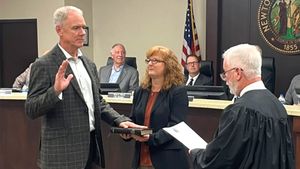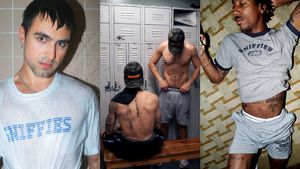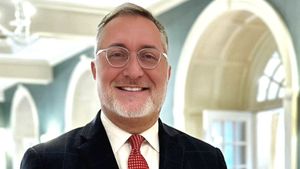Treatment GuideJust DiagnosedSex & DatingAfrican AmericanStigmaAsk the HIV DocPrEP En EspañolNewsVoicesPrint IssueVideoOut 100
CONTACTCAREER OPPORTUNITIESADVERTISE WITH USPRIVACY POLICYPRIVACY PREFERENCESTERMS OF USELEGAL NOTICE
© 2025 Pride Publishing Inc.
All Rights reserved
All Rights reserved
Scroll To Top









By continuing to use our site, you agree to our Private Policy and Terms of Use.
2022's Most Amazing People Living With HIV
Plus Magazine's People of the Year

In addition to our Person of the Year, U=U activist Deondre Moore (pictured), meet nine other people living with HIV who are bettering the world by fighting for more health care, increased access to treatment, and an end to stigma.
Oliver Sim

As part of critically-acclaimed British electronica group the xx, Oliver Sim is a hero to many Millennials and Gen Zers. So it was a huge deal when Sim, 33, not only opened up about living with HIV for over 16 years, but incorporated it into his music.
“Why don’t you leave me in the dirt? / That I’ve been sick and I’m perverse / Oh, I’m hideous,” Sim sings in “Hideous,” the lead single off his recently-released solo debut, Hideous Bastard. “Radical honesty / Might set me free / If it makes me hideous / Been living with HIV / Since seventeen / Am I hideous?”
The “Hideous” video expands on those themes of shame and self-loathing, with Sim covered in makeup and prosthetics that make him look like the monster in Beauty and the Beast. A young man tells the “beast” he’s “so sexy” and moves to kiss him, but Sim’s alter ego retreats.
Sim wants his fans to know that “Hideous” and the whole album represent a personal evolution in real time — he still struggles with self-esteem and loving himself fully, something that many people living with HIV recognize.
“Also, I’ve made an album about fear and shame to unburden myself – but I still have fear, I still have shame, I’m not a finished product,” Sim told The Guardian. “I don’t want to put myself in a position where I’m trying to present myself as one. I’m on a journey — but I’m willing to talk. To some degree.”
Part of that talking involved meeting with the Terrence Higgins Trust, one of the most prominent HIV organizations in the United Kingdom. He asked representatives there to arm him with the most accurate information on the disease, but they told him that no one is expecting him to speak in interviews like he’s a health minister; he’s an artist, and he should first and foremost share his emotions on HIV truthfully.
Sim got some lessons in communication from Jimmy Somerville, the legendary gay singer from the ’80s band Bronski Beat. Somerville lent his vocals to “Hideous” and they quickly became close friends. Sim is clearly in awe of Somerville’s decades of activism.
“There are videos of him on YouTube in the early ‘90s on breakfast television talking about things that nobody wanted to talk about — he was repeatedly saying: ‘HIV,’ ‘AIDS,’ and ‘gay,’ and he was saying this to British families eating their breakfast,” Sims said. “I assumed he was a fearless person, but having got to know him, he’s not that — he is full of fear, which makes everything he has done so much more meaningful.”
Sim may not be yet ready to fully take on Somerville’s mantle, but he’s pushing through his own fear to craft breathtakingly honest music that refuses to dance around HIV.
Deirdre Johnson

It’s easy to feel like an underachiever when looking at Deirdre Johnson’s résumé. The 47-year-old Virginian is the cofounder of the group Ending Criminalization of HIV and Overincarceration in Virginia; she’s the state lead for Positive Women’s Network-USA, a U=U ambassador, and part of ViiV Pharmaceuticals’ Black Women’s Working Group that created the campaign Risk to Reasons, which aims “to retire to word risk and replace it with reasons for HIV prevention, taking control of our total health and body autonomy.”
If that wasn’t enough, Johnson serves as the AMP microgrant assistant for the Sero Project and founded Pillow Talk, a national support group for people living with HIV.
Johnson, who’s been living with HIV for 22 years, cites Risk to Reasons as one of her proudest accomplishments this year, describing it as a “game changer for Black cis and trans women across the country.” She adds that “for the first time, we are putting Black women at the forefront of the HIV movement.”
Her work with Sero Project and helping oversee grants that fund grassroots projects is also a source of pride for Johnson.
“It has been a lifelong dream to come from out of outreach and move to the table of decision-making and providing funding for individuals that may not be attached to an agency or organization,” she says.
Creating Pillow Talk, a nationwide HIV support group that meets virtually every week, ranks as Johnson’s favorite project this year. The only requirement for participation is to be living with HIV. For the two-hour sessions, folks “relax, get support, and have an amazing time just being who we are.” Johnson says the participants, of which there are nearly 200, “are a family.”
Johnson is fine being called a leader in the HIV field but she simply sees herself “as someone that has passionately dedicated my life to create change in the world.” Johnson would not have able to accomplish so much without friends and mentors who supported her along the way.
“I would not be here if it was not for each of those that have poured into me to become a better person, advocate, activist and leader,” says Johnson. “There are so many names I could insert but know I would miss someone — but what I can say is that the Black LGBTQIIA+ family and Black women have been a major support and guide for why I do the work that I do.”
Clifford King

One look at Clifford King’s astounding photographs makes it easy to understand why the esteemed magazine The New Yorker heaped praise on him this year and beloved gay publication Butt recently relaunched with a cover featuring his handiwork. King, just shy of 30, captures Black men in love, in pain, in pleasure, in life. There is mystery in nearly all of his images, urging the viewer to linger and try to understand what is happening, what happened, and what King is trying to tell us.
King’s identity as a Black and Hispanic gay man shapes his photographs. While many of his subjects are sexy, fit, and young, they are not captured in a mainstream glamorous style; instead, some stare off into the distance, glare at the camera, and many don’t even look at the photographer at all, busying themselves with hugging, kissing, and caressing each other.
King, who grew up in Tucson, Ariz., before moving to Portland, Ore., has been living with HIV since 2018. His status is also central to his work. “Night Sweats” just features sheets and pillowcases soaked through; a result of his newfound diagnosis. Another photograph from 2018, “Orange Peel and Biktarvy,” illustrates King’s new morning routine. Is he unhappy about his new reality? Resigned? Determined? It’s for the viewer to figure out and layer on their own experiences.
Apart from magazines applauding King, the artist says that completing a short film for Visual AIDS, an art organization focused on HIV, was his proudest accomplishment of this year — as well as “further unpacking and acknowledging my [personal] traumas.”
King isn’t necessarily looking to be a role model for people living with HIV, but it’s easy to see why so many would look up to him, with all the honesty and beauty he brings to the world.
King says he hopes others see him “more so a person who is open with their status and expressing their journey within their work — to move away from stigma and normalize this condition without so much anxiety and fear.”
Harold Phillips

Over the past 17 years, Harold Phillips gained a valuable perspective on living fully with an HIV diagnosis that once seemed grim.
As a member of the Biden-Harris administration and director of the White House Office of National AIDS Policy, he collaborates with the scientific and policy communities to develop, release, and implement the National HIV and AIDS Strategy.
Through his work, he ensures the nation’s HIV response is accelerated and comprehensive and reflects the lived experience of those at risk and living with HIV. His department’s goal is to reduce HIV transmissions, improve the quality of life for people living with HIV, and end the epidemic.
“It’s both an honor and humbling to be named to the list,” Phillips says.
One of his most notable accomplishments this year was attending the International AIDS Conference in Montreal alongside Admiral Rachel Levine, the assistant secretary of Health and Human Services.
“Admiral Rachel Levine and I announced the United States’ work to fully embrace and incorporate the Undetectable = Untransmittable language into our work to combat HIV stigma and encourage people to know their HIV status and to get into HIV treatment,” Phillips says.
Phillips knows how anxious it can be to seek treatment and information about one’s HIV status.
“When I received my HIV diagnosis, it was a dark time in my life,” Phillips says. “Luckily and with the support of family, friends, and some work on my part, I used my HIV status to open a new chapter in the book of my life and committed to use my knowledge and lived experience to change health systems and create new pathways for HIV prevention and care. I hope that as a leader in the HIV movement, people with HIV get to see that with HIV treatment, this is not a death sentence, and you can create new dreams and lead a full life. I had many mentors, some who are no longer here, and so as a leader, I am hoping to pass this on to others.”
The COVID pandemic accentuated several of the inequities found within the health care system, Phillips says.
“A lot of my energy to keep going comes from the community. To be recognized as one of the people working to address these disparities and inequities to make the world a better place for people living with HIV will help fuel me to keep up the fight for justice and health care access.
Danny Pintauro

When Danny Pintauro — who starred as a child in the iconic 1980s sitcom Who’s the Boss? as well as the film adaptation of the Stephen King classic Cujo — told Oprah Winfrey in 2015 he was HIV-positive (and formerly addicted to crystal meth) he was paralyzed with fear.
“It used to be hard to walk down the street without someone recognizing me, and that was initially because I was on Who’s the Boss?,” Pintauro told People last year. “Then it was, ‘He was on Who’s the Boss? and he’s gay.’ Now, it was going to be, ‘He was on Who’s the Boss?, he’s gay, and he’s another one of those HIV-positive guys. That was a little bit terrifying, but it didn’t really make me second guess it because I’m much happier as a person with no secrets.”
In the seven years since disclosing his status, Pintauro has been freed of the shame that haunted him for years. Pintauro is married and living in Austin, Texas, where he works as a veterinarian technician, teaches acting, and still finds time to act himself — he stars in the upcoming Lifetime holiday film A Country Christmas Harmony alongside Brooke Elliott and Luke Covington. There’s even a Who’s the Boss? reboot in the works (though Pintauro hadn’t yet signed on as of press time). The actor could never had dreamed he’d be living such a full life when he was in the throes of addiction in the early 2000s. It was being honest about his life and his diagnosis that allowed all the good things to start happening.
If he could tell his younger self anything it would be, “Just relax and take a deep breath. In 10 years from now, you’re going to be married, undetectable, very healthy and very happy, and living life to the fullest,” he said last year. “I think that’s not unique to me. Anyone who has a secret that they’re going to share, or an issue that they’re trying to deal with, it’s always going to be better, especially if you believe that and especially if you do the work to get there.”
Annah Sango

Activist working mom Annah Sango could make even the most ambitious person feel like they’re not doing enough. But Sango, 34, is not here to make anyone feel less than — her mission in life is to uplift others, especially women living with HIV.
Sango, based in the Zimbabwean capital of Harare, is an advocacy officer at the Global Network of People Living with HIV. Sango’s organization, serving and staffed by PLWH, works to battle anti-HIV stigma and to expand treatment and care. Living with HIV for nearly 15 years, Sango has channeled her diagnosis into activism through her work. In addition to her work at GNP+, Sango has served on several groups and initiatives, including the Country Coordinating Mechanism, The Global Fund’s Community Rights and Gender working group, and the Ready to Lead project.
Her proudest moment this year was speaking at the International AIDS Conference in Montreal about reproductive rights and new prevention technologies for cisgender women.
“To be able to hold space and speak on behalf of my peers to policy and decision-makers is an amazingly privileged opportunity,” Sango says. “The mere opportunity of being a community voice and to hold accountable all those responsible is a big contribution to the HIV agenda.”
Balancing her career and caring for her two sons is not simple, but Sango always makes time for her mental health. “I always need to take time out to take care of me,” she says.
Sango holds a lot of respect for those who also balance it all and expresses appreciation when HIV advocates are recognized for their contributions.
“It is really encouraging that you take time to honor the different individuals that navigate through life, family, work, and still have the strength to represent their peers,” she says. “Sometimes no one recognizes the sacrifice and time and energy put into it all.”
Axel Bautista

Not many equate an HIV diagnosis with freedom, but that is exactly what activist, influencer, and groundbreaker Axel Bautista was able to find after he was diagnosed.
Turning 30 in November, and based in Mexico City, Bautista discovered purpose and self-expression through his podcast Platicando en Positivo, or Talking Positive. The series discusses life with HIV through discussions with experts and people living with the virus.
Bautista is changing lives and helping to reduce stigma through Platicando en Positivo. Bautista says that thanks to this work, he’s been able to travel and be a part of of Sidosidades Maricas (HIV+ Fags) gatherings — community get-togethers for other queers with HIV. The group “represents much of what I think about HIV: resistance, community, history, pride, visibility, freedom, and rebellion.”
Having received his diagnosis in 2014, Bautista doesn’t consider himself a leader, however, “it gives me great satisfaction, happiness, and emotion, to know that part of the work I do, the reflections I share, the ideas I think, the actions I join and in which I collaborate, or, even the craziness that drives me to work can echo in other people’s minds and hearts….I can say that my goal is to constantly build my paths towards what I believe to be a better, calmer, more relaxed and more loving life. If that path also serves as a guide for others, whether today or in the future, great and beautiful, because sometimes our lives go beyond what we can see, feel, or witness.”
He adds, “The virus has also meant a powerful reason for me to talk about social justice, inequality and violence, where I will always give priority to the struggle, the community and the resistance that HIV-positive people make. It has helped me break the silence. Thanks HIV.”
Andrew Beckerman

Architect-turned-philanthropist Andrew Beckerman is proud to call himself Canada’s longest living person with undetectable HIV.
Beckerman is also 16 years old — at least, that’s how he celebrates his Canadian citizenship. With the promise of better care and a better life, Beckerman emigrated from the U.S. and hasn’t turned back. He has now been living with HIV for more than 42 years and credits his health to treatment access.
“I have been living with HIV since I was infected in the first seven months of 1980,” Beckerman says. “I have had an undetectable viral load since November 1, 1995, thanks to my good fortune to receive one of the 1,400 places in the USA for the trial for the first effective HAART medication: Crixivan. So, unless anyone from the fortunate coterie of 1,400 has immigrated to Canada as I have, it would appear that I have the longest via HAART undetectable viral load in Canada!”
In 2022, Beckerman says he celebrated two accomplishments. The first was being named the recipient of one of 75 Government of Canada and AIDS Canada scholarships to attend AIDS 2022, the international AIDS conference, in Montreal this summer. At the conference, Beckerman spoke eloquently, passionately, and with humor at several panels.
“I [also] received from the province where I live a ‘British Columbia Medal for Good Citizenship’ [and] I received from the City where I live a ‘City of Victoria Honorary Citizenship,’” the HIV champion says of his other 2022 accomplishments.
Beckerman moved to Victoria, British Columbia, from New Mexico in 2006 and started speaking out about his HIV status. Over the years, he has donated hundreds of thousands of dollars to marginalized charities. Beckerman feels he is repaying his good fortune and favor by giving to those in need.
In 1990, when he bought his first computer, a Macintosh, the salesperson arranged for a stockbroker to meet him. Beckerman bought 100 shares for $3,000, despite not having an interest in stocks then. That fateful decision made Beckerman a very wealthy man.
“I have been able, due to my own personal situation, to have been one of the public faces of HIV, both in the USA and now for over 16 years in Canada,” Beckerman says. “I appreciate that being out about one’s HIV status is not possible for all. I am honored that I can raise my voice in public on behalf of those who yet cannot.”
Javier Muñoz

After launching into international stardom in the smash Broadway hit Hamilton, Javier Muñoz also proved himself to be a staunch activist by using his profile to highlight issues like HIV, #MeToo, and national health care.
As a Latino gay man living with HIV who is also a cancer survivor, Muñoz has a perspective that crosses many intersections. He has worked with such organizations like Gay Men’s Health Crisis (GMHC), RED, and the Latino Commission on AIDS for many years. He also helped organize the Broadway Relief Project — a coalition created in 2020 in response to the COVID-19 pandemic and the sudden shortage of PPE (personal protection equipment).
These days Munoz continues to be a force on the stage, screen, and the frontlines of HIV advocacy, especially within the Latine community.
“It is important to discuss HIV within Latine/Latinx communities because, like all marginalized communities and minority groups, we are often neglected and left without proper resources regarding our welfare,” says Munoz, who participated in Love in Gravitythis year, a new podcast focused on removing the stigma around HIV through powerful storytelling.
Muñoz also doesn’t shy away from bringing the cultural obstacles and issues facing his community to light.
“My Latine community is predominantly conservative and too scared to have open discussions, with facts and not religious-based judgments, about everything surrounding safe and healthy sex practices,” Muñoz says. “Without these conversations, equal and affordable access to all types of preventative care, and separating beliefs from reality — the number of cases of HIV will keep rising in our Latine community. We become our own obstacle when we cannot stand united as a community to fight for and advocate for the basic needs to live a healthy life.”
On the state of the battle against HIV today, Munoz says, “The world is not only misinformed about HIV but there’s also this lingering belief that the fight is over…. If you are a sexually active human being and still do not know how HIV is transmitted and that undetectable equals untransmittable [U=U], then you are part of — and perpetuating — the problem.”
“Lifting moral judgments and leaning into our shared humanity, while also having accurate information and consistently affordable access to prevention, treatment, care, and medication, is how we stop this virus,” he concludes. “That is a beautiful possibility to see on the horizon, but it requires all of us.”
Latest Stories
HRC holds 'die-in' to protest Trump health care cuts
April 28 2025 2:11 PM
Before AIDS, gay artist Rex drew hot men on the prowl — then he disappeared
April 11 2024 3:15 PM
35 Years of World AIDS Day
December 01 2023 8:35 AM
The Most Amazing HIV Allies & Advocates of 2023
November 03 2023 12:51 PM
24 Oral Sex Tips: Because Less Partners Doesn't Need to Mean Less Fun
September 02 2022 1:19 PM
19 Broadway Bares Images Too Hot to Handle
July 11 2022 5:49 PM
How is HIV Impacting Young People in 2022?
April 10 2022 7:50 AM
Broadway's best raise over $1 million for LGBTQ+ and HIV causes
April 03 2025 7:15 PM
Ricky Martin delivers showstopping performance for 2024 World AIDS Day
December 05 2024 12:08 PM
Scarlet fever: exploring our fascination with blood
March 13 2024 1:47 PM
Broadway Flea Market & Auction Raises $1.2 Million for HIV Causes
November 17 2023 2:52 PM
The Glamorous Scene at Elton John's Oscar Party/HIV Fundraiser
March 20 2023 4:28 PM
The Most Amazing People Living With HIV: 2022 Hall of Fame
November 10 2022 8:30 AM
21 Rimming Tips Everyone Should Know
August 18 2022 4:10 PM
The science behind U=U has been liberating people with HIV for years
June 04 2024 3:31 PM
Meet the 2022-2023 Pedro Zamora Scholars
January 03 2023 10:39 AM
Paris Jackson, Sheryl Lee Ralph, Evan Ross Stun at AIDS Gala
September 20 2022 3:05 PM
2022's Monkeypox Outbreak: Everything You Need to Know
July 12 2022 11:32 AM
39 Photos from AIDS/Lifecycle Red Dress Day 2022
June 10 2022 3:22 PM




































































